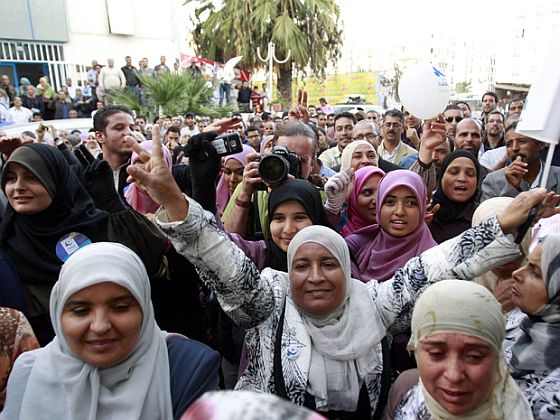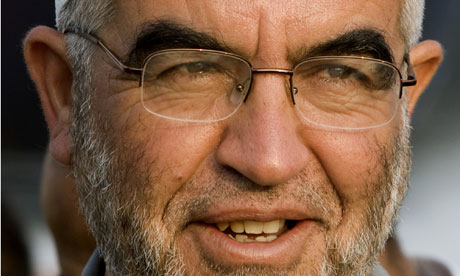Mohamed Awad, director of the Alexandria and Mediterranean Research Center, describes to Patrick Martin from Toronto’s Globe and Mail, a scenario that many in Egypt’s liberal secular elite must now dread:
“My fear,” said Dr. Awad, whose office is surrounded by models of Alexandria’s prospective future waterfront, “is that the more extreme Islamists, the Salafists, may eventually come to power.”
That could happen, he explains, if the country’s economy collapses in the next few months. “In that event,” he says, “there will be another revolution, a revolution of the poor, and this one will be very violent.”
Is he describing the threat of Islamist rule or the threat of popular rule?
Early election results from Egypt make it clear that the new parliament will be dominated by Islamists — mostly from the Muslim Brotherhood but with the main Salafist party making a stronger than predicted showing, pushing the largest secular group into third place.
A recent poll showed that 41% of Egyptians hope Egypt will emulate Saudi Arabia, while 53% favor a democratic civil state. But what these polls obscure is the fact that whoever governs, one of their overriding concerns will be that they can govern successfully and thus ensure their continued power.
Who can offer Egypt’s newly empowered politicians the most useful tuition? The Saudis or Turkey’s AK Party? (That’s a rhetorical question.)
Atul Aneja reports: Early counting in Egypt’s parliamentary elections appears to confirm the region-wide trend of Islamists — moderate, hard-line and some who are yet to be fully tested — emerging as the most potent force in the aftermath of the Arab Spring.
Following the first phase of elections which ended on Tuesday, counting in Luxor, Cairo and elsewhere is showing that the Muslim Brotherhood’s Freedom and Justice Party (FJP) has solidly outpaced its rivals in many of the constituencies.
The ultra-conservative Al Nour party is also doing well in some districts. It is either leading over the other contenders or is in second place to the FJP.
Except in a few constituencies, non-religious parties are, so far, heavily trailing the Islamists, who are not contesting as a unified bloc. The FJP and Al Nour are not pre-poll allies, though the latter is open to participation in a coalition. The Al Nour comprises mainly Salafists, who seek to recreate a society based on pristine Islam.
The electoral picture, however hazy, that is emerging in Egypt, seems to amplify a political trend fast gathering momentum in West Asia and North Africa. Moderate Islamists have emerged as the most prominent political force in Tunisia and Morocco following recent elections. An Islamist assertion is also visible in Libya in the aftermath of the killing in October of Muammar Qadhafi. Some analysts say an Islamist political resurgence through the ballot can be traced to 2002, when the Justice and Development Party (AKP), the architect of the so-called “Turkish model” of new-age Islam, triumphed in Turkey.
Despite the AKP’s Islamist roots, Turkey remains secular and has deeply engaged with moderate Islamists in Tunisia and sections of the Muslim Brotherhood in Egypt.
Emile Nakhleh and Augustus R. Norton write: Misplaced fears about the implications of an Islamist sweep are often heard in Washington, where some media pundits have asked whether the Arab Spring is devolving into an Islamist Winter. But Tunisia’s election provides an instructive model on an alternative to that scenario. The election fostered a coalescence of Islamist and secular politicians. The victory of the Tunisian al-Nahda party, which won a 40-percent plurality, may be a harbinger for the coming of Arab political normalcy and the delegitimization of “Arab exceptionalism.’’ Al-Nahda’s leader, Rachid Ghannouchi, has begun reaching out to secular groups to form a coalition government, a move that would not have happened before the demise of authoritarian regimes in Tunisia, Egypt, and Libya.
The pragmatic behavior of Islamist parties in national legislatures should be the litmus test as to whether Western governments should engage them during transition to democracy. Their legislative performance, not ideological platforms or interpretations of the sacred text, should be the metric by which to judge their credibility as mainstream political actors.
Islamist parties that have been part of governments in Indonesia, Malaysia, Morocco, Turkey, and elsewhere have not threatened their countries’ national security and stability. On the contrary, they have been credible and legitimate defenders of good government and the rule of law, and strong proponents of tolerance and pluralism.
The lesson from the Tunisian elections should be equally clear to the remaining Arab authoritarian regimes. Dominating the political space, persecuting minorities, violating their peoples’ human and civil rights, and blaming foreign “agents and provocateurs” for anti-regime protests will no longer work. This regime narrative is no longer believable, whether in Syria, Bahrain, or Saudi Arabia.
What everyone in the West needs to remember is that when Egyptians or anyone else in the Middle East cast their votes for the Islamists, in most cases they are not making an ideological statement. They are doing what voters in all representative democracies do: picking out the candidates and parties with which they have the greatest affinity, which is to say, looking for representatives who appear to understand who they are meant to represent.


